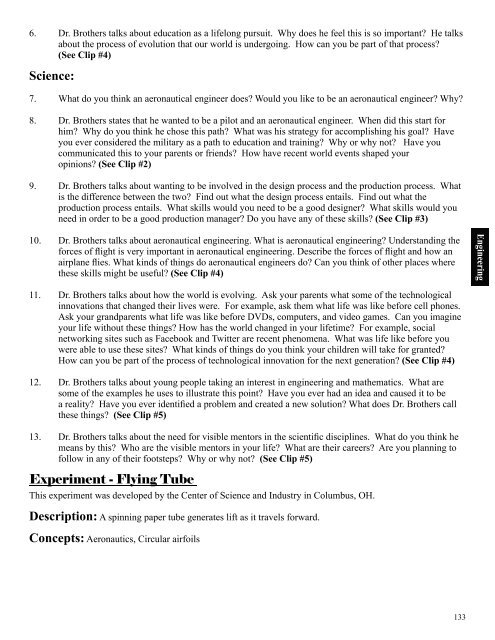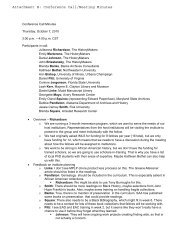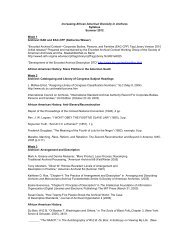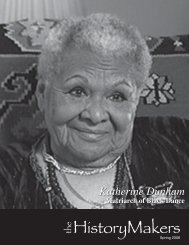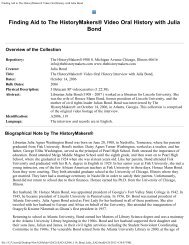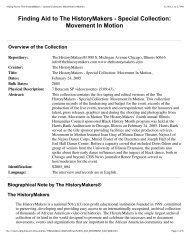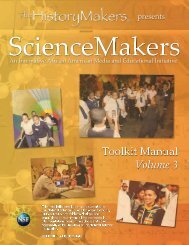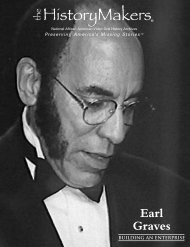ScienceMakers Toolkit Manual - The History Makers
ScienceMakers Toolkit Manual - The History Makers
ScienceMakers Toolkit Manual - The History Makers
You also want an ePaper? Increase the reach of your titles
YUMPU automatically turns print PDFs into web optimized ePapers that Google loves.
6. Dr. Brothers talks about education as a lifelong pursuit. Why does he feel this is so important? He talks<br />
about the process of evolution that our world is undergoing. How can you be part of that process?<br />
(See Clip #4)<br />
Science:<br />
7. What do you think an aeronautical engineer does? Would you like to be an aeronautical engineer? Why?<br />
8. Dr. Brothers states that he wanted to be a pilot and an aeronautical engineer. When did this start for<br />
him? Why do you think he chose this path? What was his strategy for accomplishing his goal? Have<br />
you ever considered the military as a path to education and training? Why or why not? Have you<br />
communicated this to your parents or friends? How have recent world events shaped your<br />
opinions? (See Clip #2)<br />
9. Dr. Brothers talks about wanting to be involved in the design process and the production process. What<br />
is the difference between the two? Find out what the design process entails. Find out what the<br />
production process entails. What skills would you need to be a good designer? What skills would you<br />
need in order to be a good production manager? Do you have any of these skills? (See Clip #3)<br />
10. Dr. Brothers talks about aeronautical engineering. What is aeronautical engineering? Understanding the<br />
forces of fl ight is very important in aeronautical engineering. Describe the forces of fl ight and how an<br />
airplane fl ies. What kinds of things do aeronautical engineers do? Can you think of other places where<br />
these skills might be useful? (See Clip #4)<br />
11. Dr. Brothers talks about how the world is evolving. Ask your parents what some of the technological<br />
innovations that changed their lives were. For example, ask them what life was like before cell phones.<br />
Ask your grandparents what life was like before DVDs, computers, and video games. Can you imagine<br />
your life without these things? How has the world changed in your lifetime? For example, social<br />
networking sites such as Facebook and Twitter are recent phenomena. What was life like before you<br />
were able to use these sites? What kinds of things do you think your children will take for granted?<br />
How can you be part of the process of technological innovation for the next generation? (See Clip #4)<br />
12. Dr. Brothers talks about young people taking an interest in engineering and mathematics. What are<br />
some of the examples he uses to illustrate this point? Have you ever had an idea and caused it to be<br />
a reality? Have you ever identifi ed a problem and created a new solution? What does Dr. Brothers call<br />
these things? (See Clip #5)<br />
13. Dr. Brothers talks about the need for visible mentors in the scientifi c disciplines. What do you think he<br />
means by this? Who are the visible mentors in your life? What are their careers? Are you planning to<br />
follow in any of their footsteps? Why or why not? (See Clip #5)<br />
Experiment - Flying Tube<br />
This experiment was developed by the Center of Science and Industry in Columbus, OH.<br />
Description: A spinning paper tube generates lift as it travels forward.<br />
Concepts: Aeronautics, Circular airfoils<br />
133<br />
Engineering


